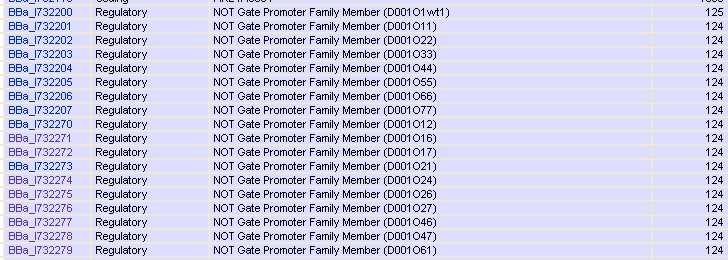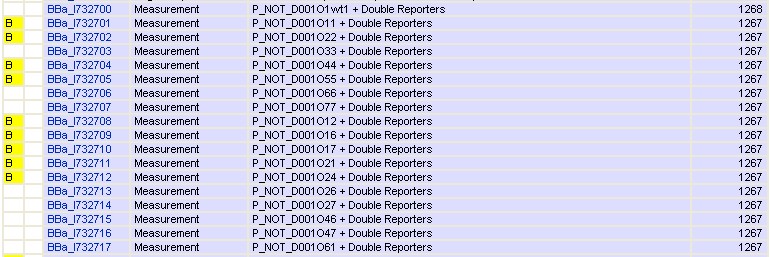USTC/NamingRules
From 2007.igem.org
m |
m |
||
| Line 1: | Line 1: | ||
| - | |||
Biologists always use symmetric LacI-family operators, e.g. AATTGTGAAC GTTCACAATT (O44) and AATTGTAAGC GCTTACAATT (O22). Please notice that they are all 20bp long and each right 10bp-long strand’s complementary strand is reversed symmetric with its left 10bp-long strand. For short we call this kinds of symmetrical operators as Oxx, for example, O44, O22, etc. Then you must have already understood what O24 means-- Yes, it means the asymmetric operator AATTGTAAGC GTTCACAATT (O24), which has the left 10bp-long strand of O22 and the right 10bp-long one of O44. Again for example, O42 means AATTGTGAAC GCTTACAATT (O42), and so on. We also give these asymmetric operators another name: [[USTC/HybridOperator|Hybrid Operators]]. | Biologists always use symmetric LacI-family operators, e.g. AATTGTGAAC GTTCACAATT (O44) and AATTGTAAGC GCTTACAATT (O22). Please notice that they are all 20bp long and each right 10bp-long strand’s complementary strand is reversed symmetric with its left 10bp-long strand. For short we call this kinds of symmetrical operators as Oxx, for example, O44, O22, etc. Then you must have already understood what O24 means-- Yes, it means the asymmetric operator AATTGTAAGC GTTCACAATT (O24), which has the left 10bp-long strand of O22 and the right 10bp-long one of O44. Again for example, O42 means AATTGTGAAC GCTTACAATT (O42), and so on. We also give these asymmetric operators another name: [[USTC/HybridOperator|Hybrid Operators]]. | ||
| Line 36: | Line 35: | ||
===Those Operators=== | ===Those Operators=== | ||
| - | [[Image:USTC_Operators_D001Oxy.jpg|thumb| | + | [[Image:USTC_Operators_D001Oxy.jpg|thumb|600px|]] |
| - | + | <br style="clear:both;"> | |
===Loaded on Double Report System=== | ===Loaded on Double Report System=== | ||
| - | [[Image:USTC_D01Oxy_DPv2GFP.jpg|thumb| | + | [[Image:USTC_D01Oxy_DPv2GFP.jpg|thumb|600px|left|]] |
| - | [[Image: | + | <br style="clear:both;"> |
| - | + | [[Image:USTC_D01Oxy_DPv2RFP.jpg|thumb|600px|left|]] | |
| + | <br style="clear:both;"> | ||
<br> | <br> | ||
<br> | <br> | ||
Revision as of 14:07, 26 October 2007
Biologists always use symmetric LacI-family operators, e.g. AATTGTGAAC GTTCACAATT (O44) and AATTGTAAGC GCTTACAATT (O22). Please notice that they are all 20bp long and each right 10bp-long strand’s complementary strand is reversed symmetric with its left 10bp-long strand. For short we call this kinds of symmetrical operators as Oxx, for example, O44, O22, etc. Then you must have already understood what O24 means-- Yes, it means the asymmetric operator AATTGTAAGC GTTCACAATT (O24), which has the left 10bp-long strand of O22 and the right 10bp-long one of O44. Again for example, O42 means AATTGTGAAC GCTTACAATT (O42), and so on. We also give these asymmetric operators another name: Hybrid Operators.
For convenience, I listed the sequences we've used:
Contents |
Symmetric Operators
O11 AATTGTGAGC GCTCACAATT O22 AATTGTAAGC GCTTACAATT O33 AATTGTAAAC GTTTACAATT O44 AATTGTGAAC GTTCACAATT O55 AATTTTGAGC GCTCAAAATT O66 AATTATGAGC GCTCATAATT O77 GACGACTGTA TACAGTCGTC
Asymmetric Operators
"Ox6", "Ox7" and "O6x"
O16 AATTGTGAGC GCTCATAATT O26 AATTGTAAGC GCTCATAATT O46 AATTGTGAAC GCTCATAATT O61 AATTATGAGC GCTCACAATT O17 AATTGTGAGC TACAGTCGTC O27 AATTGTAAGC TACAGTCGTC O47 AATTGTGAAC TACAGTCGTC
"Oxy"
O12 AATTGTGAGC GCTTACAATT O21 AATTGTAAGC GCTCACAATT O24 AATTGTAAGC GTTCACAATT
Those Operators
Loaded on Double Report System


